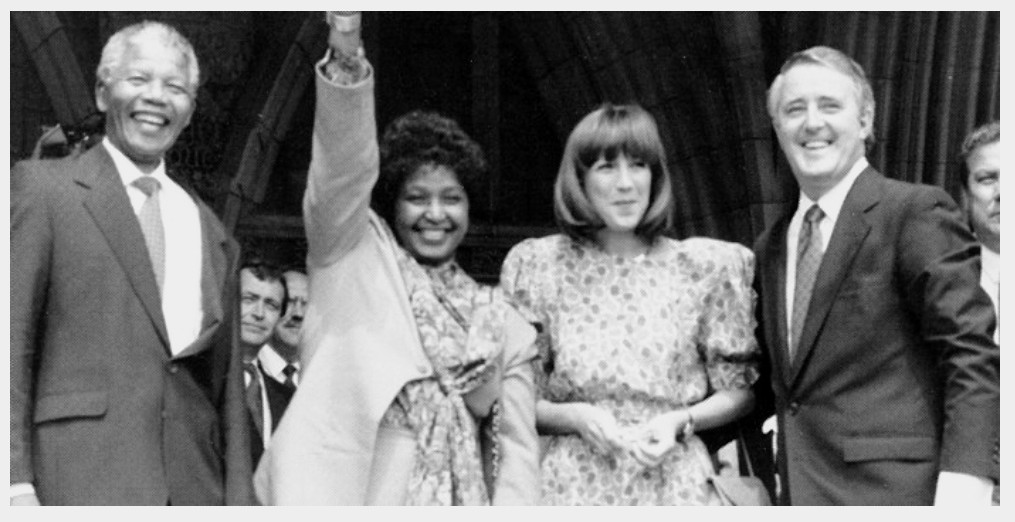
The death of South Africa’s ambassador to Denmark, Zindziswa “Zindzi” Mandela, the daughter of South Africa’s late struggle heroes, has once again reminded me of the enduring legacy of her parents that she strove to continue. Like her mother, Winnie Nomzamo Mandela, and her father Nelson Rolihlahla Mandela, Zindzi was firm in her resolve to fight for justice and liberation of the oppressed.
The brutality of racism and the apartheid system left indelible scars that robbed her and many South Africans of a normal family life, childhood, and schooling. Today, the legacy of brutality and racism under the thumb of a white minority government during apartheid continues to deprive Black South Africans of material freedom that has left South Africa in an unenviable economic situation.
The silence and indifference of most in the international community when South Africa was suffering under apartheid was inexcusable. It was this silence that provided the fertile ground for a pernicious system of institutionalized racial segregation to linger. For years, Black South Africans struggled to breathe freely as they were incessantly dehumanized and presented to the world as incapable of adapting to modern civilization. Nelson Mandela, from whom we draw many lessons, devoted his life to fighting for justice. He fought for dignity against racism and human rights’ abuse, eventually being sentenced to life imprisonment for his refusal to be silenced. The United Nations declared apartheid a crime against humanity, but still, the oppression of non-whites in South Africa continued unabated.
The world is in flux. Global uncertainty abounds. Long-simmering tensions—whether brought on by racism or inequality—have surfaced. On the eve of what would have been Nelson Mandela’s birthday, South Africa remembers Canada’s unwavering support for the anti-apartheid movement.
In many ways, South Africa was that loud, obnoxious, racist uncle at the dinner table. Annoying, but best ignored and left unchallenged. And so the evil of apartheid and racism in South Africa became deeply rooted because of the inaction, the indifference, and the silence of those who stood to benefit from the system. Emperor Haile Selassie I of Ethiopia (1930–74), who played a key role in the establishment of the Organization of African Unity (OAU), aptly said that: “Throughout history it has been the inaction of those who could have acted; the indifference of those who should have known better; the silence of the voice of justice when it mattered most; that has made it possible for evil to triumph.”
It was in the early 1980s that Canada’s leadership bravely took the initiative and led the international community in an effort to untangle the Gordian knot that was apartheid South Africa, firmly placing this country on the “right side of history.”
In June 1990, four months after his release from his 27-year imprisonment, Nelson Mandela became the first non-head of state to address a joint sitting of the Houses of Commons and the Senate in Canada. In his address, recognizing Canada’s role in South Africa’s fight against human rights’ abuse and injustice, Nelson Mandela said: “We are made better human beings by the fact that you have reached out from across the seas to say that us, too, the rebels, the fugitives; the prisoners, deserve to be heard.”
In June of this year, South Africa and Canada marked the 30-year anniversary of that momentous occasion, an occasion which would have been celebrated differently had it not been for necessary restrictions brought about by COVID-19. South Africa continues to appreciate the stance taken by Canada, risking its relations with some of its allies, in the ongoing fight against racism.
Unfortunately, recent global protests have shown that the battle against apartheid—much like the long-fought battle against slavery—continues in a much-larger war against global systemic, institutionalized racism.
On Sunday, July 18, the world will commemorate International Nelson Mandela Day. The Nelson Mandela Foundation encourages everybody to mark this day; to engage in activities that inspire change; to make a difference to someone, or a community that needs it most. In marking this day, the South African High Commission has partnered with Food for Thought, a non-profit organization, and Joe Thottungal, the award-winning chef and owner of Ottawa’s Coconut Lagoon and Thali restaurants, to provide a meal to those who cannot cook for themselves, or who live in housing without adequate cooking facilities.
In the midst of COVID-19 health and safety advisories, your International Nelson Mandela Day activity could be as simple as introspection, reflection, and sharing some thoughts at home with friends and family on issues around racism, white privilege, human rights, and the dangers of indifference. I appeal to you not to become despondent, but to stand for what is right, because no one has to be treated inhumanly from cradle to grave because of skin colour.
Sibongiseni Dlamini-Mntambo is high commissioner of the Republic of South Africa in Canada.
This article first published in The Hill Times.